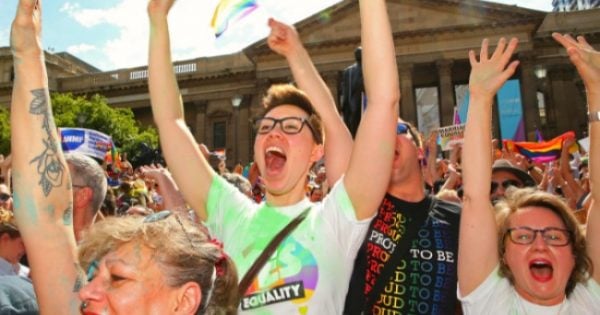It’s happened. On Wednesday morning at 10am, the Australian Bureau of Statistics announced that the majority of almost 13 million votes in the heavily maligned postal survey were in favour of marriage equality.
Australia has said ‘yes’.
Of those who voted, 61.6 per cent of Australians voted Yes for marriage equality, while 38.4 per cent voted No. An additional 0.2 per cent of the vote was unclear.
More than 12.7 million Australians voted in the survey, making up 79.6 per cent of the population.
In announcing the news, ABS chief statistician David Kalisch commended the “outstanding” number of people who came out to vote.
“This is outstanding for a voluntary survey and well above other voluntary surveys conducted around the world,” Kalisch said.
“It is worth noting our youngest on the electoral roll, the 18- and 19 -year-olds, responded strongly with around 78 per cent participation.”
Of the votes, a Yes majority was recorded for 133 electorates, while a No majority was only recorded for 17 electorates. In New South Wales, 57.8 per cent of people voted Yes in the lowest Yes vote percentage of any state. Meanwhile, ACT had the highest proportion of Yes votes, with 74 per cent. Behind the ACT came Victoria (64.9 per cent), WA (63.7 per cent), Tasmania (63.6 per cent), SA (62.5 per cent), QLD (60.7 per cent) and NT (60.6 per cent).
The Equality Campaign described the result as historic.
“This happened because millions of Australians reached out to our own families, neighbourhoods, organisations – to stand up for equality, stand by our loved ones and share why YES was so important,” spokesman Alex Greenwich said in a statement.


Top Comments
The great thing about these results is also seeing how some of the most blue chip liberal electorates overwhelmingly voted YES. Hopefully now Turnbull and the moderate Liberals can gain more confidence to push back against the extreme religious rightwing who are trying to take over the party.
I'm an SSM supporter, but this point scoring is getting tiring.
Since you are making this political. Have you seen the results of the electorates that overwhelmingly voted NO by over 70%.
They are not Blue Ribbon seats, they are from Labor in Western Sydney and not right wing by any means, they are rock solid Labor electorates and have been so for years.
Conversely, Tony Abbots electorate voted overwhelmingly Yes, even when he was NO a supporter.
So it's weird all round right? There is no need to cherry pick.
Yeah, the next election is going to be ... interesting, to say the least (for so many reasons). If One Nation was politically savvy & organised enough (hah!), I could see them picking up some votes in Western Sydney.
I am a Liberal voter so it makes me glad that my area voted YES. I have never voted Labor before but I do know a lot of Labor voters who are definitely in the NO camp. That is up to them and their party to discuss.
I actually am not trying to point score anything, just pleased that the classical "small l" liberal vote still exists as I feel moderate liberal voices have been drowned out over the last few years. Sorry you have taken my comment so badly.
Yes I wonder how Labor are going to reconcile their multicultural policies when it’s the constituents in those electorates who have benefitted from the policies but demonstrate strong intolerance and non-alignment with prevailing community values. I wonder if anyone is going to be brave enough to raise that awkward point
I don't see the issue with allowing parents to remove their kids from classes that don't support their views on marriage. If there are exemptions for celebrants to refuse participation in marriage ceremonies because it is against their religious beliefs, then this is only an extension of that.
Personally, I don't think it is up to the education system to decide when my child should be taught about sexuality and how. I'd prefer manage this conversation within my own home. I have nothing against SSM, but I would like to introduce the concept to my kids when I feel they are ready.
the problem arises when a homophobic parent has a lgbt kid and refuses to engage with the child. better all kids receive appropriate education from a teacher trained to give the best advice for all kids then leave it to parents who wont accept who their kids are, dont really know or know how to express the best sex ed or just dont want to teach their precious sweet kid about the birds and the bees/birds
What does this vote have to do with what you teach your children? Teach them what you like. Live and let live.
I honestly don't understand why sexuality has to be taught at all? Not trying to be snarky, I'm genuinely curious, since I'm not aware of anyone feeling the need to teach kids about heterosexuality.
My kids have known gay people their whole lives. Close family members are gay. My son started kindergarten with the son of a gay couple. I never had to explain it to them, they have simply always known and accepted it, the same way they accept hetero couples and single parents.
And what exactly are people worried about schools teaching? If kids don't know about gay people before they start school, they'll probably find out fast enough when one (or more) of their class mates has gay parents. It just seems silly to me to try and avoid the issue altogether when gay people exist and are in every part of society. What are people trying to protect kids from?
The vote has nothing to do with it. But the proposed bill does, hence my opinion.